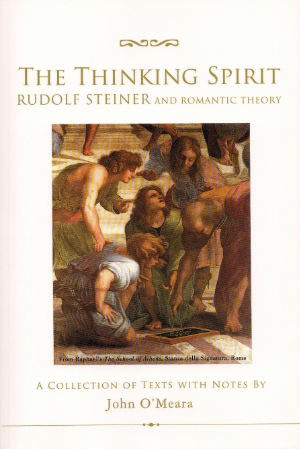The AUTHOR in a SECOND STAGE
The middle and third parts of John O’Meara’s Shakespeare trilogy had elaborated on an approach to Shakespeare inspired by the revelations of Rudolf Steiner. They were accompanied by an edition of Steiner’s work that highlights his relevance at once to the development of Romantic experience and Shakespeare’s own development along analogous lines in an earlier age as presented in O’Meara’s trilogy. This edition of Steiner’s work appeared in 2007 as The Thinking Spirit: Rudolf Steiner and Romantic Theory.
[Also available at a university library near you.]
The other Romantic authors featured in this edition are S.T. Coleridge, Ralph Waldo Emerson, Goethe, and Novalis. The work of these authors is seen as falling into line with Steiner’s further elaboration of Romantic thought in the modern era.
*For the further analogous link between Steiner and Shakespeare, see by way of introduction, “The Thinking Spirit and Othello’s Sacrifice as Parallel Texts Intended for Joint Reading” —https://issuu.com/johnomeara1797/docs/the_thinking_spirit_and_its_place
[Note that Othello’s Sacrifice is conveniently re-printed in John O’Meara’s Remembering Shakespeare. Details on the accessibility of The Thinking Spirit are given here.]
By this stage, John O’Meara had come to champion a Romanticist view also of the modern and postmodern eras, which he sees as dead-ends. Only a continuation of the Romantic tradition can see us through the impasse of Imagination that he associates with these eras. In this next stage, O’Meara turned his attention more broadly to Romantic and post-Romantic literature, illustrating his view of the modern “impasse” in greater detail. In The Modern Debacle (2007), he offers close readings of the work of numerous modern authors. In this book, O’Meara brings out the further appeal that is made by these authors for an imagination of the Goddess as a means of generating the kind of creative activity that can lead us out of the “debacle”. Then, in Myth, Depravity, Impasse: Graves, Shakespeare, Keats (2008, rpt. 2011), John O’Meara looks deeper into literary tradition to re-assess the significance of recourse to the Goddess as saving power especially as advocated by Robert Graves and Ted Hughes. In this book O’Meara applies his knowledge of Shakespeare’s own affiliation with his Goddess to the modern perspectives of these two representative authors. Shakespeare is viewed as a model of investigation in this regard, at once more successful and more comprehensive by virtue of his deeper acknowledgment of the compromising influence of human depravity in this investigation. The modern “impasse” is featured again, prophetically, in the final section on Keats, whose own attempts to unite with the creative power of the Goddess were dissipated by the modern tendencies in his work.
After The Modern Debacle, and Myth, Depravity, Impasse, John O’Meara brought out This Life, This Death: Wordsworth’s Poetic Destiny in 2010, focusing especially on Wordsworth’s finally deeply pathetic relationship to creative Nature. Together these three new books constituted O’Meara’s second trilogy. In the first two parts he had already noted the close association between an imagination of the Goddess and the creative power of Nature, the Goddess as Nature, as a potential way out of the modern impasse. The three studies were soon collected in 2012 under the title On Nature and the Goddess in Romantic and post-Romantic Literature.
